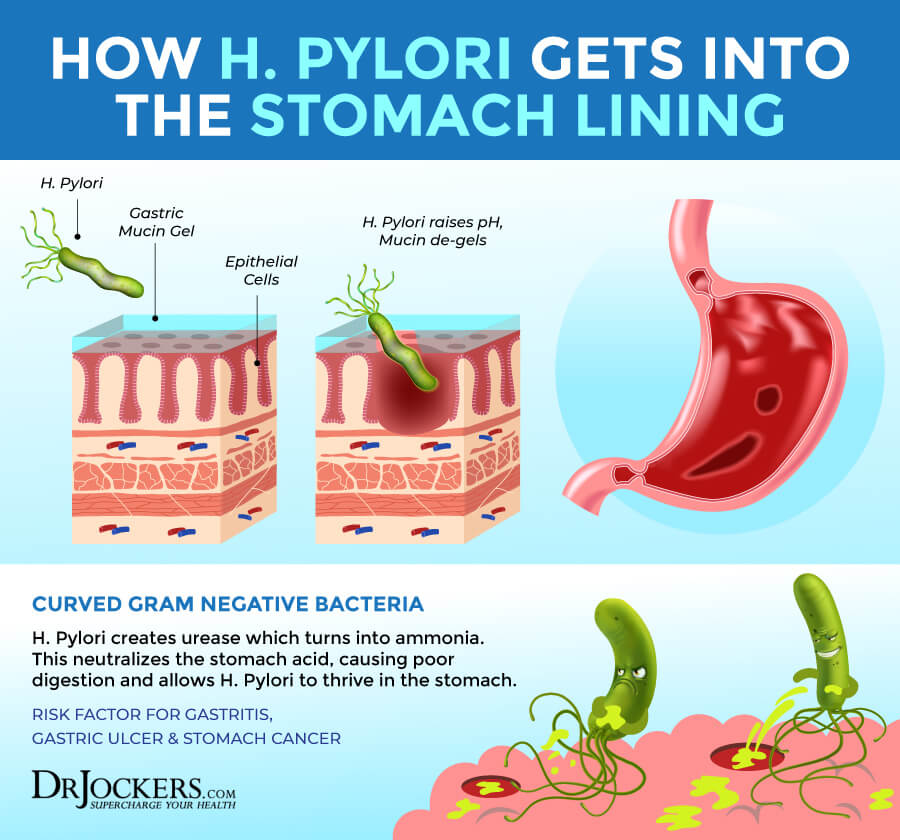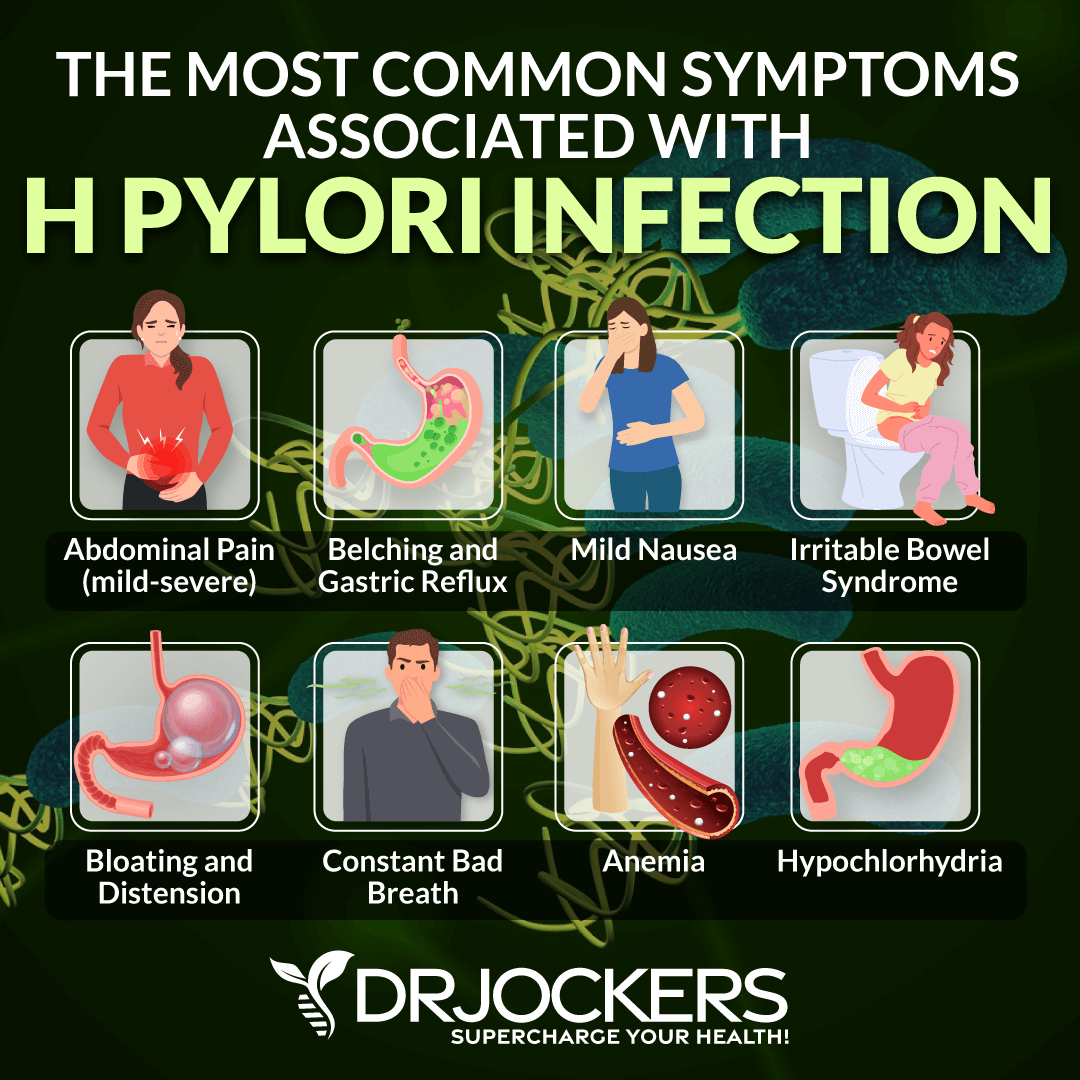![]()

H pylori is an opportunistic bacteria that can infect and spread rapidly in individuals with a compromised immune system. While this bacteria is natural and beneficial to our bodies in small amounts, it can be extremely dangerous when allowed to propogate without control. This infection is the leading cause of stomach ulcers, poor digestion and stomach cancer.
It is estimated that over 50% of the world’s population has elevated levels of H Pylori. This microorganism can spread very quickly through the saliva and so it is easily transmitted. It is very common to see entire family’s test positive for this infection. Immune compromised individuals can develop this through sharing a drink, kissing and eating off the same dishes as an infected individual.

The Hazards of an H Pylori Infection:
H.Pylori is a very sophisticated microorganism that has incredible adaptive advantages that give it the ability to survive the stomach’s harsh environment. It produces an enzyme called “urease” which breaks down the urea in the stomach into carbon dioxide and ammonia. This causes belching and halitosis (bad breath) for the individual and it neutralizes the acidifying effects of hydrochloric acid.
Hydrochloric acid is necessary for creating an acidic environment in the stomach to digest protein and ionize minerals. This also helps to stimulate bile release from the gallbladder to effectively metabolize fat in the small intestine. Without these key functions working optimally we become at risk for anemia, thyroid problems, osteoporosis and auto-immunity.
The secretion of mucous protects the stomach lining from irritation by food stuffs and microorganisms. H Pylori reduces the stomach’s ability to produce mucous and irritates the stomach lining. This creates a silent level of inflammation until the irritation become so severe that enough pain receptors fire off. This is the pathogenesis of stomach ulcers.

Other Problems with H Pylori Infection:
Other issues that can be caused by a H Pylori infection include pernicious anemia which is a B12 deficiency. Your stomach produces a protein called intrinsic factor which allows the small intestine to absorb B12. H Pylori affects the stomach’s ability to produce intrinsic factor which causes this problem. The major symptoms associated with pernicious anemia are constant fatigue, shortness of breath, pale skin, swollen tongue and nausea.
H Pylori disrupts the digestive process so it can lead to inflammation throughout the gut and gastrointestinal permeability. This state of leaky gut can also cause iron-deficient anemia, irritable bowel symptoms with fluctuating diarrhea and constipation and ulcerative colitis.
Since gut health is intimately related to brain health, an H Pylori infection can lead to depression, anxiety and trouble concentrating. Altered digestion also increases food sensitivities and auto-immune reactions. This can lead to any number of auto-immune conditions that are so prevalent in our society today.

Testing For H Pylori Infections:
1) Stool Testing: This is considered the gold standard in H Pylori diagnosis as it counts the actual particles of the H Pylori organism.
2) Blood Tests: These tests look for anti-bodies to the H Pylori organism and will test for IgA, IgG and IgM reactions. If these anti-bodies test positive it is a clear diagnosis of an infectious process. Research has shown that this is a good test for acute infections but long-term infections and individuals with weakened immunity often do not have elevated anti-bodies.
The other issue with H Pylori antibodies is they may be present even when the infection is under control. This means you will test positive even when you are actually negative and the organisms are in their proper numbers.
3) H Pylori Breath Test: The H Pylori organism produces urease which breaks down urea in the stomach into ammonia and carbon dioxide. The breath test measures for elevated CO2 that is produced from this reaction.
4) Endoscopy: This is a highly invasive procedure where a scope is inserted into the esophagus and stomach. This is stressful on the body and does a poor job of analyzing for the presence of this infection but it can see the results of the infection such as irritation, ulcerations and cancer in the stomach.
Why I Choose This Stool Test:
After researching all of these methods the stool test was the stand-out winner due to the relatively low cost and its reputation as the gold standard method. It is significantly lower than the endoscopy and blood work and slightly lower than a breath test.
Non-Invasive: A stool test is easy to perform and doesn’t require blood work or a scope inserted through the esophagus.
Research Standard:A 2009 review of H Pylori tests considered the stool test as the best diagnostic marker of H Pylori over-growth in the body.
Reputation: Most doctors consider this the gold standard for H Pylori
Most individuals who are interested to see if they have an H Pylori infection would most likely want to get a comprehensive stool analysis as well so they could do these together with separate bowel movements.
Total Cost: $195.00
If you live in New York or New Jersey, some lab testing may not be able to be completed. Please contact our team at (847) 222-9546 to verify that this request can be fulfilled.
For a Sample Report Click Here


Fortunately, because of the many thousands of newsletter readers and social media followers, my team has been able to network with a great lab distributor and get the best possible pricing for everyone.
The retail value (using market value and insurance based rates) is highly inflated and driving up the cost of health care. This is the old, archaic method that many people are still using and paying way more for insurance and co-pays than they really should be.
Many intelligent people are saving insurance premium dollars and turning to pay by order labs such as DirectLabs and others. These skip the middle man (doctors’ visits) and cut down costs for the patient.

If the test requires blood work you can take your kit to any local lab and have the trained professional take your blood and fill out the kit and send it in the mail.
Urine and blood prick tests can all be done in the comfort of your home and sent into the lab with the mailing slip in your kit. All instructions will be sent to you with the kit. It is a very simple process that most anyone can figure out. The lab also has a customer service phone # if any help is needed.


